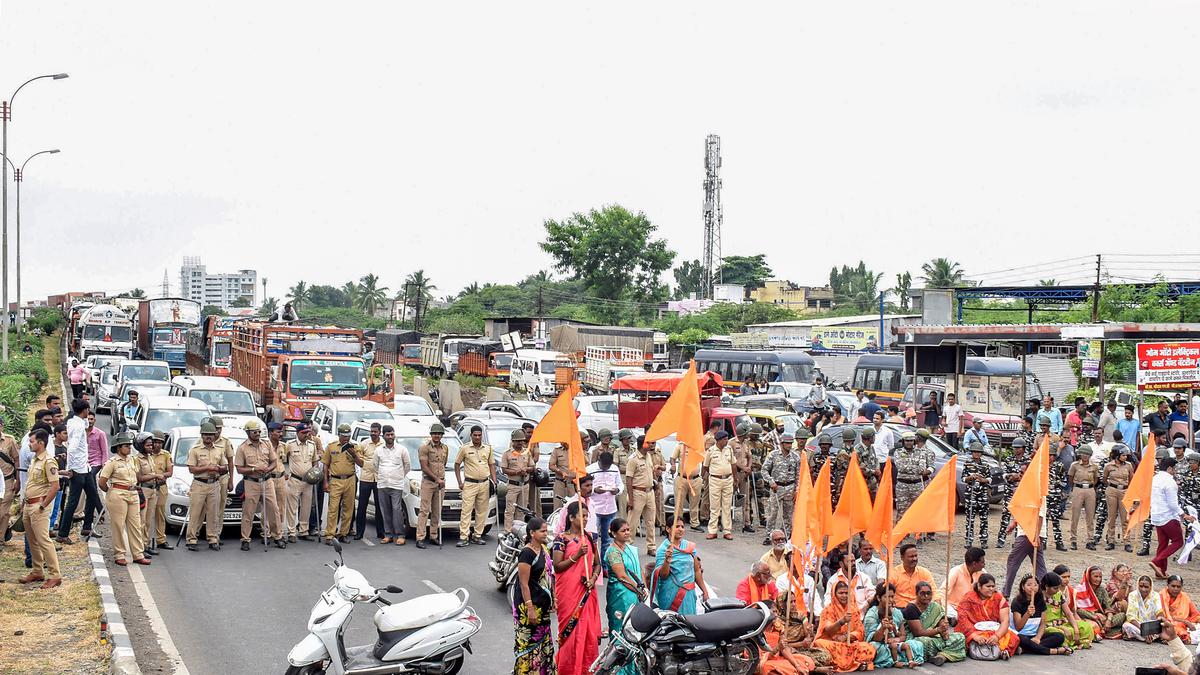
Maratha quota stir to continue till govt relaxes condition of genealogy: Manoj Jarange
The Hindu
Maratha quota protester Manoj Jarange welcomes CM's decision to issue Kunbi caste certificates to Marathas from Marathwada, but demands relaxation of genealogy condition.
Maratha quota protester Manoj Jarange, who has been on a hunger strike in Maharashtra’s Jalna district, said on September 7 that their agitation will continue till the State relaxes the condition of genealogy while giving Kunbi caste certificate to the community members from the Marathwada region.
He was speaking a day after Chief Minister Eknath Shinde said that Kunbi caste certificates would be issued to those Marathas from the region who possess revenue or education documents from the Nizam era that recognise them as Kunbis.
The Marathwada region was part of the erstwhile Nizam-ruled Hyderabad kingdom before it became part of Maharashtra.
Addressing a press conference at Antarwali Sarathi in the district, Mr. Jarange welcomed the State’s decision and said it has initiated some steps that had not happened earlier. However, he appeared far from pleased.
“Though we have not received the GR [Government Resolution] about the government’s decision yet, we learnt that it will give Kunbi caste certificates to those Marathas who have genealogy. If we have genealogy, we do not need a GR at all to get a [Kunbi caste] certificate,” he said.
Kunbis, a community associated with agriculture, are grouped under the Other Backward Classes (OBC) category in Maharashtra and enjoy reservation benefits in education and government jobs.
Mr. Jarange, whose protest has reignited the Maratha quota issue in the state, said they want the condition of genealogy relaxed.

“Writing, in general, is a very solitary process,” says Yauvanika Chopra, Associate Director at The New India Foundation (NIF), which, earlier this year, announced the 12th edition of its NIF Book Fellowships for research and scholarship about Indian history after Independence. While authors, in general, are built for it, it can still get very lonely, says Chopra, pointing out that the fellowship’s community support is as valuable as the monetary benefits it offers. “There is a solid community of NIF fellows, trustees, language experts, jury members, all of whom are incredibly competent,” she says. “They really help make authors feel supported from manuscript to publication, so you never feel like you’re struggling through isolation.”

Several principals of government and private schools in Delhi on Tuesday said the Directorate of Education (DoE) circular from a day earlier, directing schools to conduct classes in ‘hybrid’ mode, had caused confusion regarding day-to-day operations as they did not know how many students would return to school from Wednesday and how would teachers instruct in two modes — online and in person — at once. The DoE circular on Monday had also stated that the option to “exercise online mode of education, wherever available, shall vest with the students and their guardians”. Several schoolteachers also expressed confusion regarding the DoE order. A government schoolteacher said he was unsure of how to cope with the resumption of physical classes, given that the order directing government offices to ensure that 50% of the employees work from home is still in place. On Monday, the Commission for Air Quality Management in the National Capital Region and Adjoining Areas (CAQM) had, on the orders of the Supreme Court, directed schools in Delhi-NCR to shift classes to the hybrid mode, following which the DoE had issued the circular. The court had urged the Centre’s pollution watchdog to consider restarting physical classes due to many students missing out on the mid-day meals and lacking the necessary means to attend classes online. The CAQM had, on November 20, asked schools in Delhi-NCR to shift to the online mode of teaching.









